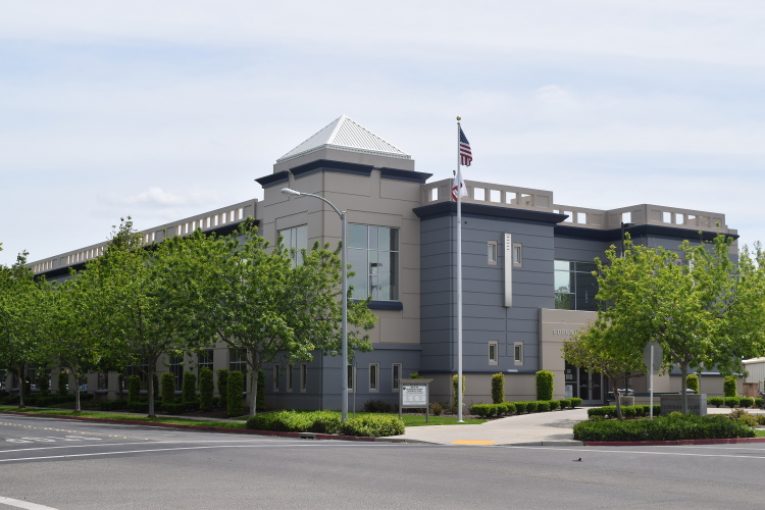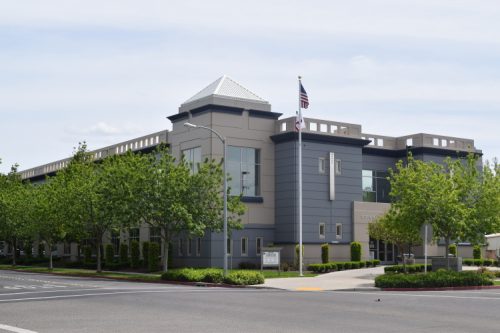

By Crescenzo Vellucci
Vanguard Sacramento Bureau Chief
MERCED, CA – A potentially historic trial for establishing animal rights involving a former “Baywatch” and movie actress moved along – albeit slowly – in Merced County Superior Court this week as jury selection dragged into Friday, and Judge Paul Lo made several key rulings that could change the course of the proceedings.
Actress Alexandra Paul and San Francisco Bay Area activist Alicia Santurio are on trial on misdemeanor petty theft charges for rescuing at-risk chickens from a Foster Farms truck just before they entered a Foster Farms slaughterhouse in Livingston, CA Sept. 28, 2021.
After providing access to video of an alleged crime https://youtu.be/LxnIwWmFd1E, Paul admitted, “We published this video within an hour with both my name and Alicia Santurio’s name attached to it because we believe what we’re doing is legal and morally right. We’re rescuing sick chickens from a factory farm that has a history of abusing them.”
The trial has spawned a series of pretrial and other motions from both sides, and the trial’s Tuesday beginning was delayed after a judge scheduled to hear it was diagnosed with COVID.
The defense was able to get a favorable ruling from the court before trial requiring Foster Farms, whose slaughterhouse would have been the final destination for the rescued chickens, to provide records showing the health conditions of the flock of chickens on the truck when the rescue took place – both chickens received medical treatment, but one died while the other is alive at a sanctuary.
But late Wednesday, Judge Lo announced Paul and Santurio could not use the so-called “necessity defense,” and, while not unexpected, could make it more difficult to present justification for the actions of the chicken rescues, according to those close to the defense.
Other than that, the defense received favorable judicial rulings, said supporters.
Said Paul, the longtime Hollywood and TV actress, “I’m feeling great. We have a very fair judge and we’ll try to get a fair jury. Lots of wins today. They (the prosecution) don’t know what they are getting into,” noting that she (and Santurio) turned down five plea deals because “I have the right to go to court,” even if the chicken she liberated “does not.”
The necessity defense “involves a determination that the harm or evil sought to be avoided by such conduct is greater than that sought to be prevented by the law defining the offense charged. Necessity does not negate any element of the crime, but represents a public policy decision not to punish an individual despite proof of the crime,” argued the defense in its motion in limine.
Cases from the late 1990s, according to the defense filing, explain that to “justify an instruction on the defense of necessity, there must be evidence sufficient to establish that defendant violated the law (1) to prevent a significant evil, (2) with no adequate alternative, (3) without creating a greater danger than the one avoided, (4) with a good faith belief in the necessity, (5) with such belief being objectively reasonable, and (6) under circumstances in which he did not substantially contribute to the emergency.”
Defense counsel argued the accused “acted in an emergency to prevent a significant evil,” citing CA law that “explicitly authorizes…trespass to provide an animal with necessary food and water,” and the “needless suffering of animals (the freed chickens) is a significant evil that public policy aims to curtail.”
The defense also cited several examples of laws in CA being broken to protect the well-being of animals, and argued in its motion that the accused’s “conduct was not pre-empted by explicit public policy. Rather, it was entirely consistent with California’s public policy to minimize animal cruelty.”
“Upon looking inside the transport truck, Ms. Santurio saw Ethan ‘downed’ with splayed legs. This led her to immediately believe, based on her experience caring for similar birds, that he was suffering from acute pain and distress,” the defense argued.
On the day Santurio and Paul rescued two birds, Jax and Ethan, DxE released hidden camera footage from “inside the slaughterhouse showing chickens routinely missing the stun bath and a device designed to cut their necks, leaving it to workers to identify conscious birds before their evisceration, at a speed of 140 birds per minute.”
According to a story in The Intercept, an animal rights group, Mercy for Animals, in 2015, said it “documented workers throwing live chickens against metal shackles, birds being scalded alive, and other treatment that the group argued amounted to animal cruelty.
DxE’s new footage, said The Intercept, shows Foster Farms, California’s largest poultry producer, “continuing to engage in similar behavior that activists allege amounts to cruel treatment of live chickens. Foster Farms, which was recertified by the AHA earlier this year, has been on the receiving end of millions of dollars in state and local subsidies to expand its product lines in California.”
The Intercept, after it viewed the footage, said it “shows workers throwing live chickens on the concrete floor; discarded yet conscious birds under the weight of one another; some chickens missing electrical waterbaths designed to stun them before slaughter — all under the supervision of employees working dangerous and long shifts in the dark.”
Although it’s not expected to be argued at length at trial, DxE alleges, the footage details “a violation of California code outlawing animal cruelty, Foster Farms’ AHA certification, and the company’s own policy to raise chickens free from hunger, discomfort, pain, cages, and distress.”
The accused took their actions to “prevent a greater danger” because authorities failed, said the defense, to do their duty, noting that after underground video showed the treatment of the chickens, Mercy for Animals complained to the Federal Trade Commission that Foster Farms’ labeling of its products as certified by the American Humane Association, or AHA, deceived consumers. The agency declined to take action.”
The defense maintained in its motion the caged chickens “would not be provided with such care and worse, would likely suffer unlawful animal cruelty…a factfinder could conclude (the) actions in rescuing (the chickens) were necessary to prevent the significant evil of unnecessary animal suffering (and) There were no adequate legal alternatives.”
The defense added the chickens’ “obvious condition created the immediate need for rescue and care… (an) analogous situation to an overheating dog left unattended in a car. A reasonable person would act to save that animal and California law explicitly provides them immunity from criminal liability.”
The judge, however, refused the defense motion and it’s unknown how this information will be provided to the jury when the defense presents its case.
The prosecution – and the judge agreed – argued the necessity defense should not be allowed because it should apply only to “people,” not non-human animals, although the defense said the law doesn’t state the defense of necessity does not apply to non-humans.
Direct Action Everywhere (DxE), supporters of Paul and Santurio, said after court Wednesday, “Climate activists have been attempting to use the necessity defense in cases involving civil disobedience. Some have gotten the necessity defense permitted in trial, but none of these cases have yet resulted in an acquittal by reason of necessity.”
The defense did claim wins in other motions, including an advice of counsel defense, that immunizes an accused if they did “not breach the obligation of good faith and fair dealing if (they) reasonably relied on the advice of (their) lawyer, and mistake of law defense, which, among other things, is a defense if an accused “made an honest or good faith mistake about the law.
The judge also repeated his previous ruling allowing evidence of the chickens’ value, and granted the defense motion to exclude the testimony of Shane Sutton, Foster Farms’ Vice President of Operational and Strategic Accounting. The prosecution had intended to call Sutton to testify to the value of the birds, but only added him to the witness list two days before trial, which the court frowned upon.
Requests by the prosecution to “gag” Paul and Santurio, restrict demonstrations or what rally goers were wearing and limit press rights were also rejected by the court.